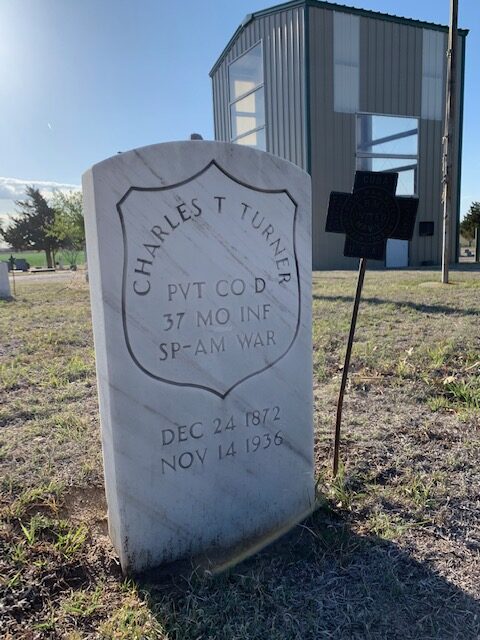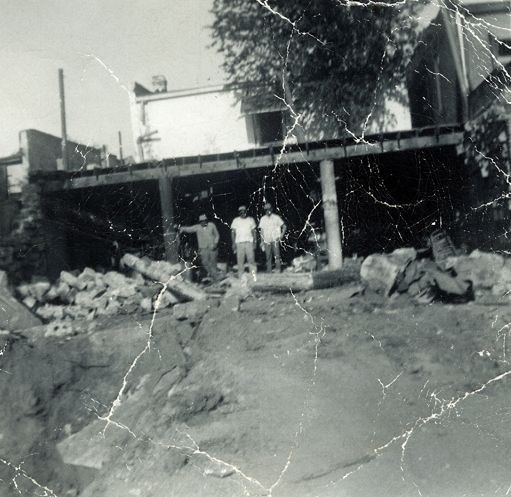I left off last week in 1923 with Charles Turner running the Santa Fe Trail Hotel at 618 S. Colony (where the south end of the Farmer’s Bank and Trust building stands now). Charley’s future in Kinsley is so intriguing, I can’t resist telling you more about him. I found the following in various newspaper articles and in Myrtle Richardson’s book “Changes Rode the Wind” (pp 333-340).
Early on, rumors of prostitution, check forgery, and thievery had tainted Charles Turner’s reputation. After his second wife’s death when he came back to manage his hotel in 1920, it appears that they had not gone away, and rumors continued to disparage him.
Charles put a lengthy, special notice in the newspaper refuting these rumors. Within it, he wrote: “I do not drink or sell intoxicating liquor of any kind and for the benefit of busy bodys and back-biters, moral perverts and physical cowards, I want to say that I am more particular about the conduct and character of the people that stop at my place than the officious of the law are of the conduct and character of some of the persons that walk the streets here….” But his public protestations never quelled the gossip of him fencing stolen goods and even people disappearing in his establishment to be buried in his basement. Nothing was ever charged or proven.
On the other hand, the Graphic tells a different story about a night in December 1924 when a fire broke out in a room above the Gibbs Lunch Room, which I believe was located just north of the hotel. Mr. Claud Cravens occupied the room above the restaurant, and he caused a fire when he fell asleep while smoking in bed. The blaze woke him up, but in the dark and smoke filled room, he was unable to find the door. In his attempt to get out, he turned over an oil stove.
Charley Turner heard Craven’s calls for help and rushed up the outside stairs, threw open the door, and pulled him to safety. Charley then picked up the stove and threw it out. He returned to his hotel to get fire extinguishers and put out the blaze. Charley was badly burned on his face and hands, and was treated by Dr. DeTar. Cravens only suffered from smoke inhalation.
This act showed another side of the Charley’s character which was further uncovered after his death. Letters were found amongst his papers which revealed many acts of kindness, including correspondence with men serving time in penitentiaries.
At some time, Charley began selling merchandise from his building. In 1930 he had “Dandy Ranges and Heating Stoves to sell for cheap”. By 1933 he was advertising his establishment as the Kinsley Sales Co., a second-hand store.
Charley had a quirky sense of humor. He always gave his address as 614 or 616 Broadway instead of Colony Ave. He advertised that he had “the largest stock of used goods between Nettleton and Ardell.”
Today we would probably say Charley became a hoarder. “The junk is unbelievable….It would seem as if something miserly was in the man who saved everything no matter how valueless.” (Graphic, Dec. 3, 1936) “In his stock were sewing machine bobbins, men’s and women’s coats in styles of a number of years ago, stoves, guns, furniture and even caskets.” (Graphic, Nov. 19. 1936) There were many watches—pawned? or stolen? He had 160 guns including a box of pistols in a closet with plenty of ammunition.
Charles Turner died of acute diabetes at the age of 63 on Nov. 14, 1936. He died in a bathing suit which he refused to take off, He had wrapped black wool yarn around his toes, legs, and body which he believed would ward off gangrene and other diseases.
Charley left an unwitnessed codicil to a will which was never found. The codicil indicated his estate, not worth very much, should go to his first wife. But because it was not witnessed and the will could not be found, it instead went to the school fund.
His first wife and her family attended his funeral, perhaps in expectation of the inheritance that did not materialize. American Legion members served as pall bearers carrying him to an unmarked grave in the veteran plot of Hillside Cemetery. His forlorn little dog was all left to mourn him.

If you are interested in other details of Charles Turner’s life and death, the Richardson book cited above is available at the library and for sale at the Edwards County Museum which reopened for the season this week.

